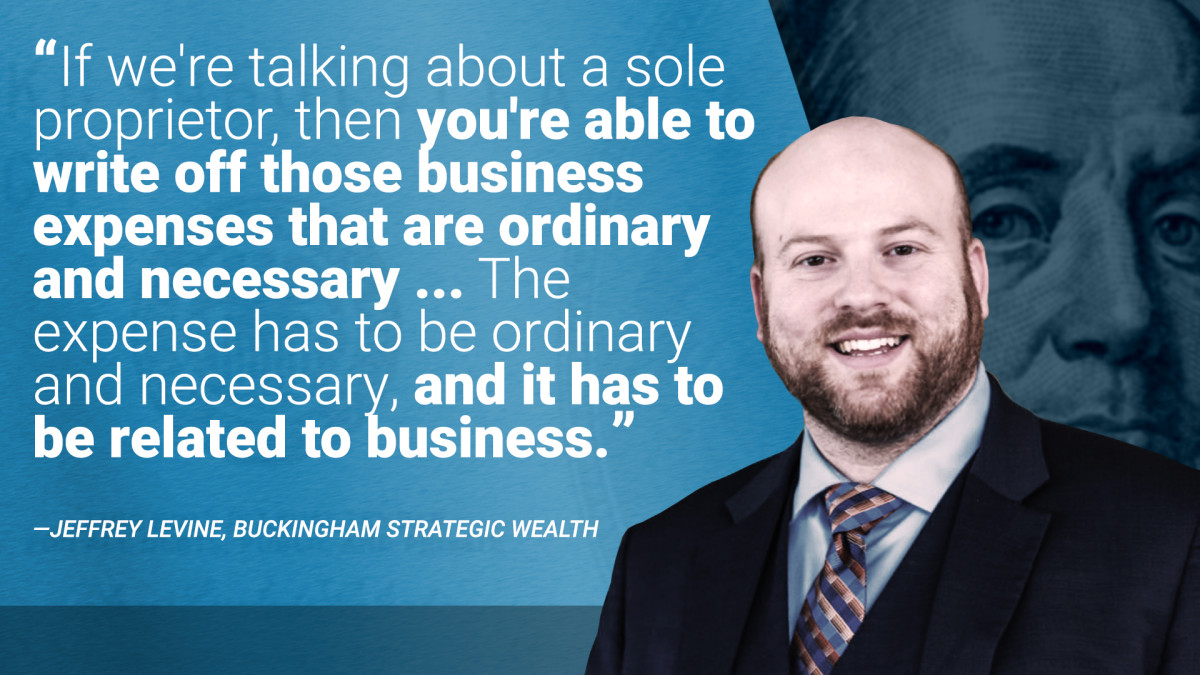Are you traveling this summer for business? Or, maybe you’re thinking about bringing your family on a business-related trip. If you’re wondering which travel-related expenses are tax deductible, and which are not, you’re in luck.
Our Retirement Daily’s Robert Powell caught up with Jeffrey Levine, CPA and tax pro from Buckingham Strategic Wealth Partners, to discuss business-related travel expenses and your taxes.
Watch the video above for tips and examples, or read the video transcript below.
TurboTax Live experts look out for you. Expert help your way: get help as you go, or hand your taxes off. You can talk live to tax experts online for unlimited answers and advice OR, have a dedicated tax expert do your taxes for you, so you can be confident in your tax return. Enjoy up to an additional $20 off when you get started with TurboTax Live.
Recommended: Tax Deductions for Business Travelers
Sole Proprietors & Business-Related Travel: If you are a sole proprietor, you can write off business expenses that are ordinary and necessary.Employees & Business-Related Travel: If you are an employee, you cannot deduct unreimbursed business expenses. The only way an employee can get a benefit for their expenses is to submit it to the employer and have the employer reimburse them. Quotes| Tax Tips for Business-Related Travel Expenses Jeffrey Levine, Chief Planning Officer, Buckingham Strategic Wealth Jeffrey Levine, Chief Planning Officer, Buckingham Strategic WealthRecommended: Tax Tips for Sole Proprietors
Video Transcript| Jeffrey Levine, CPA and Tax Expert, Buckingham Strategic WealthRobert Powell: What do taxpayers need to know about business-related travel expenses? Well, here to talk with us about that is Jeffrey Levine from Buckingham Wealth Partners. Jeffrey, what tax tips do you have for us there?
Jeffrey Levine: Well, the first thing we have to do, Bob, is separate out who we’re talking about here. Are we talking about employees or are we talking about people who own their own businesses, sole proprietors, etc.? If we’re talking about a sole proprietor, then you’re able to write off those business expenses that are ordinary and necessary. Now, that doesn’t mean it can’t be expensive. Someone might need to fly first class. Someone might need to fly a private jet if it gets them to a specific spot at a certain amount of time. But the expense has to be ordinary and necessary, and it has to be related to business.
Now you can sometimes combine business and pleasure, right? Maybe you’re going away for work, but you bring your family along with you because they’re also going on vacation at the same time. Or you’ll turn your work trip into an extended few days. Well, the extended few days, obviously, that’s not a business expense. And your family’s travel with you is not a business expense. But otherwise, your travel can still be considered part of the business expense for the time you’re there for work.
Now, if we look at employees, it’s really important to make the distinction here because employees cannot deduct expenses related to the business. You cannot deduct unreimbursed business expenses. It used to be deductible as a miscellaneous itemized deduction, but since the Tax Cut and Jobs Act of 2017, so beginning in 2018, we haven’t had miscellaneous itemized deductions. So the only way an employee can effectively get a benefit for their expenses is actually to submit it to the employer and have the employer reimburse them for their expenses.
For S corporation owners who actually own their own business, this can get a little bit complicated and a little bit tricky where you essentially submit your own receipts to your business and then have your business reimburse you. And it kind of seems like, well, isn’t it the same thing? It’s not. It has to be part of what’s known as an accountable plan. An accountable plan. But the best thing, Bob, if you are the business owner and the employee, just have those expenses purchased or use the business credit card, use the business bank account, to begin with instead of your personal account or assets where they would have to be reimbursed.
Robert Powell: Right, so one quick follow-up, Jeffrey. A lot of times people have questions about whether they can deduct the food that they eat while they’re on a business trip.
Jeffrey Levine: Yeah, so that would also be a travel expense. It is typically it’s under the meals and expenses amount. So generally it’s up to a 50% deduction. However, we’re right now under special rules where you can deduct 100% of meals if they are from a “restaurant.”
Editor’s Note: The content was reviewed for tax accuracy by a TurboTax CPA expert.
Zachary Faulds contributed to the writing of this article and produced the video and/or the graphics associated with it.
